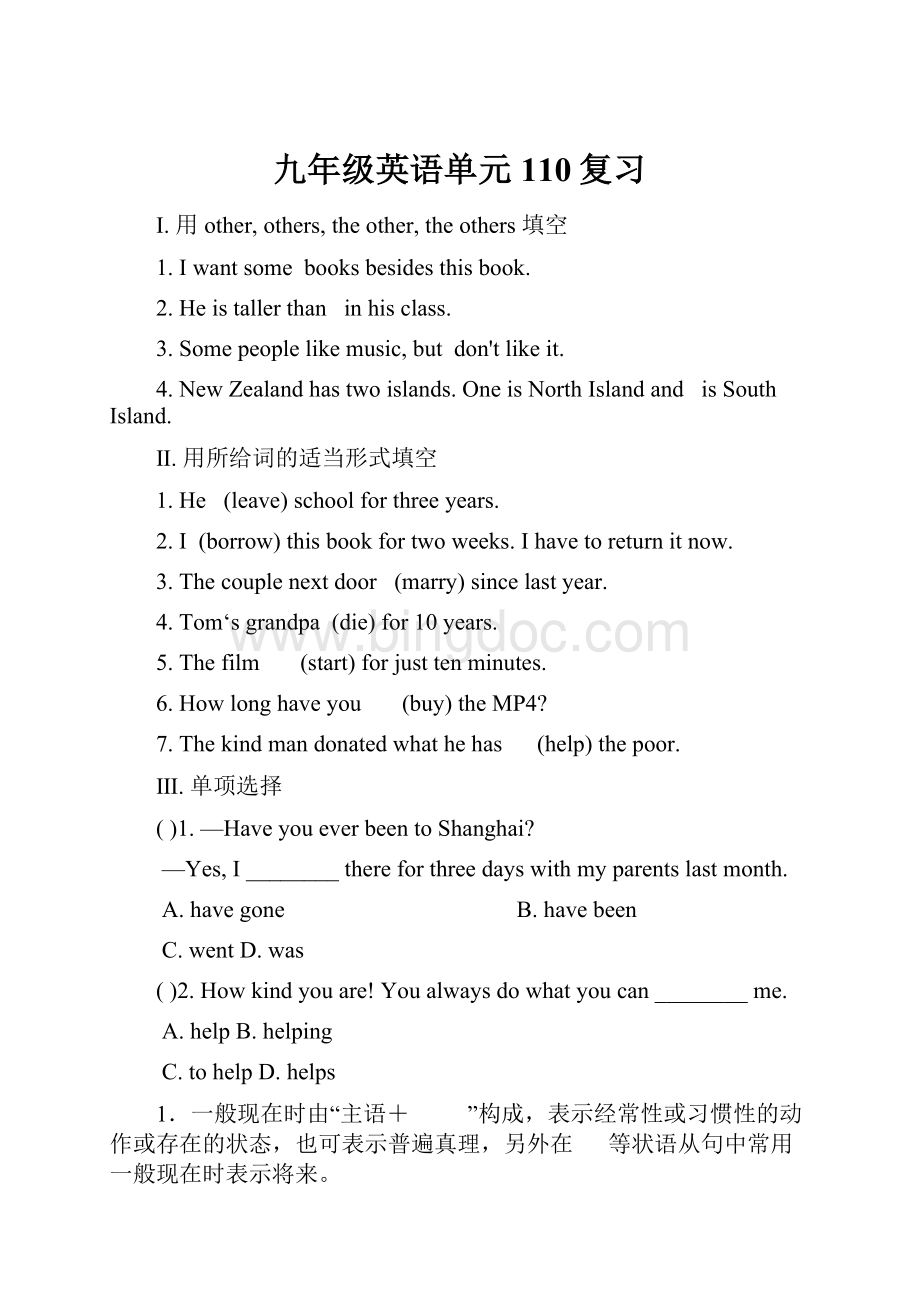九年级英语单元110复习.docx
《九年级英语单元110复习.docx》由会员分享,可在线阅读,更多相关《九年级英语单元110复习.docx(14页珍藏版)》请在冰点文库上搜索。

九年级英语单元110复习
Ⅰ.用other,others,theother,theothers填空
1.Iwantsomebooksbesidesthisbook.
2.Heistallerthaninhisclass.
3.Somepeoplelikemusic,butdon'tlikeit.
4.NewZealandhastwoislands.OneisNorthIslandandisSouthIsland.
Ⅱ.用所给词的适当形式填空
1.He(leave)schoolforthreeyears.
2.I(borrow)thisbookfortwoweeks.Ihavetoreturnitnow.
3.Thecouplenextdoor(marry)sincelastyear.
4.Tom‘sgrandpa(die)for10years.
5.Thefilm (start)forjusttenminutes.
6.Howlonghaveyou (buy)theMP4?
7.Thekindmandonatedwhathehas (help)thepoor.
Ⅲ.单项选择
()1.—HaveyoueverbeentoShanghai?
—Yes,I________thereforthreedayswithmyparentslastmonth.
A.havegone B.havebeen
C.wentD.was
()2.Howkindyouare!
Youalwaysdowhatyoucan________me.
A.helpB.helping
C.tohelpD.helps
1.一般现在时由“主语+ ”构成,表示经常性或习惯性的动作或存在的状态,也可表示普遍真理,另外在 等状语从句中常用一般现在时表示将来。
2.一般过去时由“主语+ ”构成,表示过去某个时间发生的动作或存在的状态。
3.一般将来时由“ +动词原形”构成,表示将来发生的动作或存在的状态,常与“in+ ”连用。
4.现在进行时由“ +doing”构成,表示此时此刻或现阶段正在进行的动作或状态。
5.过去进行时由“ +doing”构成,表示过去某一时刻正在进行或发生的动作,常与atthattime,atthistimeyesterday,at8:
00yesterday等词连用。
6.现在完成时由“ +动词的过去分词”构成,表示过去发生的动作对现在产生的影响或结果,常与already,yet,ever等词连用;也表示过去发生的动作或状态一直持续到现在,且有可能继续下去,常与for,since连用,此时句中动词须是 。
()1.—IlikedtoplaybasketballwhenIwasyoung.
—________.
A.Sohewas B.Sowashe
C.Sodidhe D.Sohedid
()2.—Hi,Mary.We'regoingtohelpGrandmaLiwithherhouseworkthisSaturdayafternoon.
—________.
A.SoamIB.SoIamC.SowillID.SoIwill
()3.—It'sterriblycoldtoday,isn'tit?
—Yes.________yesterday.
A.SoitwasB.SowasitC.SoitisD.Soisit
()4.—Iwillnevercometothisrestaurantagain.Thefoodisterrible!
—________.
A.NoramIB.NeitherwillIC.SamewithmeD.SodoI
()5.We'llgoclimbingifit________tomorrow.
A.won'trainB.didrainC.isn'trainD.doesn'train
()6.—Petercouldhardlyseethewordsontheblackboard,couldhe?
—________.Hehaswornapairofglasses.
A.Yes,hecouldB.No,hecould
C.No,hecouldn'tD.Yes,hecouldn't
()7.—Mr.WanghasneverbeentoCanada,hashe?
—________.Hewentthereonbusinesslastweek.
A.No,hehasn'tB.Yes,hehas
C.No,hehasD.Yes,hehasn't
()8.Idon'tknow________next.
A.whatshouldIdoB.whattodo
C.howshouldIdoD.howtodo
1.语态是动词的一种形式,表示句子里主语和谓语动词的关系,分为主动语态和 。
主动语态表示主语是动作的执行者;被动语态表示主语是动作的 。
只有 动词才能用于被动语态。
2.被动语态的基本结构是由“be+ ”构成的,如果需要强调动作发出者,可在其后接“by...”,意为“被……”。
这里be是助动词,必须与主语的 和数相一致,并有时态的变化。
3.一般现在时的被动语态结构为:
主语(动作承受者)+ +动词过去分词+by+sb.(动作执行者)。
4.被动语态的句型有:
(1)肯定句:
主语+be+过去分词+(by...)。
(2)否定句:
。
(3)一般疑问句:
?
(4)特殊疑问句:
疑问词+be+过去分词+(by...)?
()1.—HaveyoureadtheworksofShakespeare?
—Yes,it'swellworth________.It's________greatbooksthatI'vereadseveraltimes.
A.reading;soB.reading;such
C.toread;soD.toread;such
()2.Thereare________booksthatIcan'tdecidewhichtobuy.
A.somany B.suchmany
C.somuchD.suchmuch
()3.Wecan'tbuy________muchmuttonwith________littlemoney.
A.so;muchB.such;so
C.so;soD.such;such
()4.Sheis________anicegirl________weallwanttohelpher.
A.such;thatB.too;to
C.so;thatD.very;that
()5.Atlasttheboywasmade________andbegantolaugh.
A.stopcryingB.tostoptocry
C.tostopcryingD.stoptocry
()6.—Didyouwinthefootballgame?
—Badluck.Ourteam________inthefinalone.
A.wonB.beat
C.waswonD.wasbeaten
()7.Ourbasketballteam________theirsby3to2.
A.beat B.beating C.won D.winning
1.一般过去时的被动结构为:
+动词过去分词。
2.一般将来时的被动结构为:
will/begoingto++动词过去分词。
3.主动语态转换成被动语态时的几种特殊情况:
(1)带双宾语的主动句变被动句,常把指人的变为主语,直接宾语保持不变;若把指物的变为主语,则在保留的间接宾语前应加上相应的介词 。
(2)含有“动词短语”的主动句变被动句,因为动词短语是一个不可分割的整体,所以动词短语中的 不可丢。
(3)含有“感官动词和使役动词”的主动句中省略to,但在变成被动句时需加上不定式符号 。
如:
句型seesb.dosth.→被动:
;
makesb.dosth.→被动:
。
()1.________,letmeintroducemyselftoyou.
A.Atfirst B.Firstofall
C.AtallD.Aboveall
()2.________,Idon'tliketheChinesefood,butnowIlikeitverymuch
A.AtfirstB.Firstofall
C.AtallD.Aboveall
()3.Heisstrong,braveand,________,honest.
A.atfirstB.firstofall
C.atallD.aboveall
()4.Doyouhave________tosay,Lily?
A.somethingelseB.anythingelse
C.elsesomethingD.elseanything
()5.Thereare________waysofdoingthisexercise.
A.elseB.other
C.anotherD.others
()6.What________doyouwanttotellme?
A.elseB.other
C.anotherD.theother
()7.—Doyouknowwhoinventedthepaper?
—Yes,CaiLun________.
A.inventedB.was
C.didD.done
1.现在完成时的被动结构:
have/has++动词过去分词。
如:
TheTempleofZhangFei.
2.情态动词的被动结构:
情态动词+ +动词过去分词。
如:
Bookscould (produce)morequickly.
3.现在进行时的被动结构:
am/is/are+ +动词过去分词。
如:
Look!
Thebridge (build)bythemnow.
4.过去进行时的被动结构:
was/were+ +动词过去分词。
如:
Aletter (write)atthistimeyesterday.
()1.Weshouldplantmoretreeson________sideoftheroad.
A.every B.both
C.allD.each
()2.—Youhavetriedonseveralshirts.
—Sorrytotakeuptoomuchofyourtime.But________ofthemlookgoodonme.
A.neitherB.any
C.noneD.both
()3.—Thecoatistooexpensive.
—Don'tworry.Here'sanotherone.It'sniceand________,Ithink.
A.cheapB.dear
C.beautifulD.bright
()4.—Mum,couldyoubuymeadresslikethis?
—Certainly,wecanbuy________onethanthis,but________this.
A.abetter;betterthanB.aworse;asgoodas
C.acheaper;asgoodasD.amoreimportant;goodas
()5.I'llwork________Icaninthefuture.
A.sohardlyasB.sohardas
C.ashardlyasD.ashardas
()6.IsawJack________footballinthestreetjustnow.
A.playB.plays
C.playingD.played
合成词是由两个或两个以上的词合成的一个新词,前一个词起修饰后一个词的作用。
合成词的主要构成方式有合成名词和合成形容词:
1.合成名词(①bedroom;②playground;③diningroom;④overcoat;⑤blackboard;⑥gettogether)
(1)名词+名词____
(2)形容词+名词____
(3)动词+名词____(4)副词+名词____
2.合成形容词(①fourhour;②5yearold;③manmade;④warmhearted;⑤wellknown;⑥fulltime)
(1)数词+名词____
(2)数词+名词+形容词____
(3)形容词+名词____(4)名词+过去分词____
(5)副词+过去分词____
(6)形容词+过去分词____
3.试翻译下列合成词:
greenhouse blueprintblacksmith teamwork
()1.Doyouknow________?
A.whereareyoufrom B.whereyouarefrom
C.whereyoucomesfrom D.wheredoyoucomefrom
()2.Iwanttoknow________tomorrow.
A.ifhecomesB.whendoeshecome
C.howwillhecomeD.whetherhe'llcome
()3.Canyoutellme________thenearesthospital?
A.howcanIgettoB.whereIcangetto
C.howIcangettoD.whereIcangetto
()4.Thenumberofpeopleinvited________fifty,butanumberofthem________absentfordifferentreasons.
A.were;was B.was;was
C.was;were D.were;were
()5.Thispairofshoes________niceonyou.
A.lookB.looksC.islookD.looking
()6.—________doyouvisityourgrandpa?
—Onceamonth.
A.HowfarB.HowmanytimesC.HowoftenD.Howsoon
1.常见的前缀 表示“不,无”,如:
disappear
表示“不,无”,如:
impossible
表示“错误”,如:
misunderstand
表示“不,非”,如:
nonsmoker
表示“使可能”,如:
enable
表示“再,重复”,如:
rebuild
表示“反对”,如:
antipollution
表示“多”,如:
multimedia
2.常见的后缀 表示“可能”,如:
enjoyable
表示“充满……的”,如:
careful
表示“少,不足的”,如:
careless
表示“人”,如:
visitor
表示“方向”,如:
eastern
表示“人”,如:
artist
表示“状态,性质”,如:
kindness
表示“由……制的”,如:
wooden
()1.Ipromisethatmatterwill________.
A.betakencare B.betakencareof
C.takecare D.takecareof
()2.Ihavemanyhobbies,________football,baseballandsoon.
A.forexampleB.suchasC.infactD.arelike
()3.TheSmiths________Guangxiforover30years.
A.havebeentoB.havebeenin
C.hasbeentoD.hasgoneto
()4.Don'tplayfootballinthestreet,________?
A.shallweB.doyouC.willyouD.don'tyou
()1.Tomrunsfasterthan________boyinhisclass.
A.anyother B.any
C.theotherD.other
()2.InthisclassTomismuchtallerthan________.
A.anystudentsB.anystudent
C.theotherstudentsD.theother
()3.NoonerunsasfastasJohninhisclass.Thesentencemeans________.
A.Johnrunsfastestinhisclass
B.Johnrunsfasterthananyotherboyinhisclass
C.Johnrunsmoreslowlythananyotherstudentinhisclass
D.Johnrunsasfastasothersinhisclass
()4.Maryisusedto________aTshirtandjeans.
A.wearB.puton
C.wearingD.puttingon
()5.Haveyoufoundtheinformationaboutthestars________wecanuseinthereport?
A.thatB.who
C.whoseD.whom
()6.Theroom________asameetingroom.
A.usedtobeingusedB.wasusedtobeingused
C.usedtobeusedD.usedto
1.在英语中,定语可分为和,作定语的成分有很多,包括名词、形容词、动名词、过去分词、分词短语、不定式、介词短语及定语从句等。
如:
Ilikedumplings(make)byhand.
2.在复合句中作定语,修饰主句中某个的从句,叫定语从句。
被定语从句所修饰的词叫 。
引导定语从句的词叫,包括关系代词和关系副词。
关系代词在定语从句中作,关系副词在定语从句中作 。
如:
Ihaveasisterthatis9yearsold.(先行词是 ,引导词是。
)
3.含定语从句的复合句的基本结构为:
先行词++定语从句。
4.关系代词that:
that在定语从句中既可用来指,也可用来指;在定语从句中充当。
如:
Doyouknowthegirlthatisstandingunderthetree?
(that在定语从句中作)
Shegotacomputerthatherparentsboughtforher.(that在定语从句中作)
()1.Tom________hisEnglishbookyesterday.
A.forgot B.left
C.leavesD.hadleft
()2.________withourschool,theirsismuchlarger.
A.ComparedB.Compare
C.ComparingD.Tocompare
()3.Mywatchisnottheonlything________ismissing.
A.thatB.it
C.whichD.who
()4.Heneverreadsanything________isnotworthreading.
A.thatB.as
C.whoD.which
()5.That'sall________Ihaveseenandheard.
A.whichB.that
C.whereD.what
()6.Whoistheman________isreadingabookoverthere?
A.thatB.